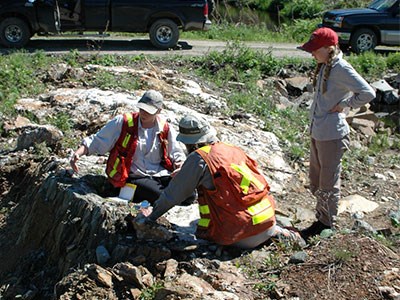Collège Boréal is opening a new avenue for people to enter the mining industry with its upcoming prospecting and exploration technician program.
The two-year program, which will launch later in 2015, will prepare students for entry-level jobs in the prospecting and exploration stages of a mine's life.
Jeff Lafortune, a professor with the program, said Boréal decided to create the program after a series of committee meetings in 2007 and 2008.
One member of the advisory committee suggested the college offer a program to train future prospectors and exploration technicians.
The school then consulted with the mining sector to see if such a program was needed.
“The majority of the respondents indicated there was a need,” Lafortune said.
Students will learn a variety of skills to aid them in the exploration cycle, including how to use geographic information systems, mineral and rock identification, field mapping, and how to use AutoCAD, a popular program that allows for computer-aided design and drafting.
After they graduate, prospecting and exploration technicians will work under the supervision of geologists, geological engineers, and site managers. They will work in collaboration with drilling and surveying workers, mine operators, and blasters.
Lafortune said entry-level jobs often pay around $40,000 a year and offer many opportunities for advancement, either through experience or continued education to become a field geologist, for instance.
The program, he said, is aimed at people who love the outdoors and have a strong sense of adventure.
The first class, which begins in September 2015, said Lafortune, will be able to accommodate 15 to 20 students.
Dick DeStefano, executive director of the Sudbury Area Mining Supply and Service Association (SAMSSA), said the program is important because a large number of prospectors are near retirement.
Staking mining claims is also the first step toward mineral production and wealth creation.
But DeStefano said he expects a lot of the program's graduates to become entrepreneurs, launching their own exploration companies.
While the mining industry could be in better shape when they graduate, the ongoing downcycle has been especially hard on exploration.
“It's been a rough year,” said Garry Clark, the executive director of the Ontario Prospectors Association. “We are forecasting things to pick up a bit in 2015, but it's not going to be the boom times for sure.”
But Boréal's first prospecting and exploration technician class will graduate in 2017, and Clark said he expects the market to be in better shape by then.
“They'll probably fall into the perfect time,” he said.
During mining downcycles, Clark said a lot of prospectors go back to school and find other work. Most don't return to prospecting when markets improve after they've landed stable work elsewhere.
Because of the labour migration, he said it will be important to have young prospectors to pick up the slack in boom cycles.




